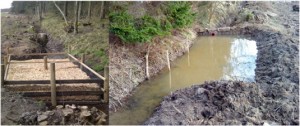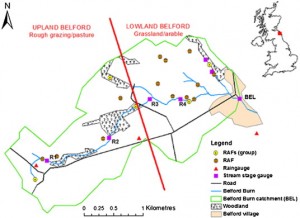Claire Walsh and Mark Powell are currently working with the Big Lottery funded, Greening Wingrove community partnership project. This was established to encourage the people of Wingrove Ward (Newcastle) to ‘green’ their local area and explore more sustainable ways of living.
While much of Claire and Mark’s work has centred on exploring ways to evaluate the project’s success, they have also helped organise workshops that showcase CEG research, especially around flooding. The most recent workshop took place on Wednesday evening of last week, when CEG PhD student Eleanor Starkey presented at a local community event entitled, ‘When Water Engineers Meet Gardeners.’
This workshop was designed to showcase civil engineering approaches to managing urban flood risk and using models, illustrate the potential impact of extreme flood events on both the local Wingrove area and Newcastle City more generally. Eleanor revealed that while Wingrove is not an area particularly badly affected by floods, water runoff from this part of the city significantly impacts on other areas. Eleanor presented a reconstruction of the 2012 ‘Toon Monsoon’ and introduced the concept of Sustainable Drainage Systems (SuDS) and their possible multiple benefits. These measures not only slow down the speed of storm water runoff, which benefit the city as a whole, but also provide local householders with a water supply for use in the garden.
While encouraging individual households to keep a single water butt might appear to offer only minor benefits for larger flood management strategies, this might also encourage a more general interest in gardening and a cultural shift in how individuals choose to engage with their environment.
However, many Wingrove residents live in terraced properties with concrete yards, and therefore have limited access to land suitable for planting and growing. One challenge for the Greening Wingrove Project is to encourage residents living in these areas to also take up the greening philosophy. In an effort to identify new planting opportunities, Mark Ridsdill Smith has been running a series of project workshops on how to grow using containers and window boxes. According to Mark, who writes a column in The Guardian on ‘Vertical Veg,’ a major problem for container growers is securing a reliable water supply. Installing a water butt for gardening use not only reduces costs it also makes for a much speedier watering operation. During the workshop, Mark demonstrated how to build different forms of water reservoir and irrigation systems, all fed from a water butt connected to domestic guttering down-pipe
http://www.theguardian.com/lifeandstyle/2014/mar/14/container-gardens-mark-ridsdill-smith
Eleanor and Mark Ridsdill-Smiths’ presentations revealed how installing a water butt in Wingrove has the potential to provide a range of interdependent benefits. The water butt not only forms part of a Sustainable Drainage Systems (SuDS), it also offers a ready-made solution to the problem of container growing. By encouraging local people to cultivate plants and enjoy the greening of previously concrete yards, the Wingrove Project seeks to generate new environmental perceptions and engagements that will have citywide benefits. To find out more about the Greening Wingrove project visit http://greeningwingrove.org.uk/





